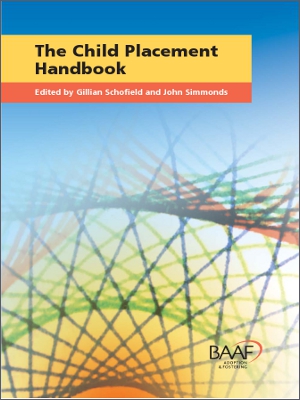
The child placement handbook
Research in child placement can play an essential role in aiding understanding of the complex relationships between systems, professional practice and child outcomes, by describing, analysing and suggesting links between them.
The last 30 years have seen a significant investment by successive governments in providing a research evidence base for child placement and in making connections between research, policy and practice. This authoritative collection of reviews of key aspects of child placement, written by renowned and leading academics and practitioners, aims to capture something of this wealth of knowledge and wisdom across diverse child placement issues.
Child placement research plays an important part in informing and supporting the complex roles and difficult decisions of social workers, thus increasing the likelihood that professional judgements will lead to better outcomes for children and families. This challenging task is clearly recognised in every chapter of this collection, as authors from research and practice set out and evaluate the evidence: its strengths, its limitations, and implications for future policy and practice.
Who is this book for?
All qualifying, post-qualifying and experienced social workers and social work managers looking to improve their child placement practice.
What you will find in this book
The first section sets the scene in relation to the role of research in child placement, child placement policy in an international context, the developmental consequences of abuse and neglect and a key issue for all practice in child placement – listening to children and young people.
The second section covers not only a range of placement options, but also some key issues relating to each, such as contact after adoption and fostering adolescents, which extend and complement the core chapters.
The final section looks at placement issues in relation to meeting the specific needs of children, such as health and education; in relation to certain groups of children, such as disabled children and unaccompanied asylum seeking children; and in relation to specific issues, such as leaving care and access to information.
Editors
Dr Gillian Schofield is Professor of Child and Family Social Work and Co-Director of the Centre for Research on the Child and Family at the University of East Anglia.
Dr John Simmonds is Director of Policy, Research and Development at CoramBAAF.
Contributors
David Berridge, Nina Biehal, Sarah Borthwick, Roger Bullock, Jennifer Cousins, Elaine Farmer, Julia Feast, Catherine Hill, Malcolm Hill, David Howe, Joan Hunt, Jenifer Lord, Elsbeth Neil, Alan Rushton, Hilary Saunders, Gillian Schofield, Peter Selman, Julie Selwyn, John Simmonds, Ian Sinclair, Mike Stein, Olive Stevenson, June Thoburn, Nigel Thomas, Jim Wade, Dinithi Wijedasa, Kate Wilson and Julie Young
This title is now only available as an eBook which you can purchase at our eBookstore together with a range of many other of our popular titles which you can access via your browser or the dedicated app.
Questions about eBooks? Check out our FAQs
Sorry, but this book is currently out of stock.
Reviews
This is an important text. It is highly successful in identifying the most important and useful information in relation to each of the topics covered and making it readily accessible. The synthesis of research is outstanding.
Andrew Hill, lecturer in social work, University of York, British Journal of Social Work
Besides bringing the material from different studies into a single volume, the discussion is refreshing, stimulating, not short of ideas and presented in a reader-friendly way. It is not often that an edited book can be of such consistently good quality. It may be some years before another such book appears and it should be treated as a kind of encyclopaedia of child placement.
Satnam Singh, Senior Manager, Office for Children, Youth and Family Support, ACT, Australia, Adoption & Fostering
